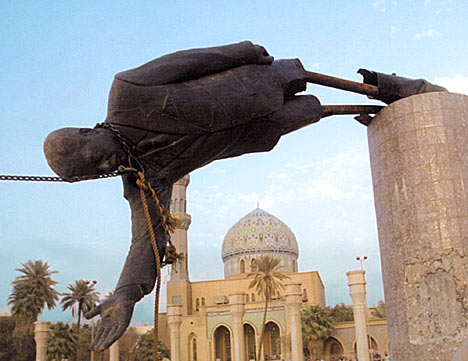| | | Iraq: After False Promises |  |
| | | كاتب الموضوع | رسالة |
|---|
Atifa Romaya
عضو فعال جداً




الدولة : 
الجنس : 
عدد المساهمات : 248
تاريخ التسجيل : 19/02/2010
الابراج : 
 |  موضوع: Iraq: After False Promises موضوع: Iraq: After False Promises  الخميس 23 سبتمبر 2010 - 16:01 الخميس 23 سبتمبر 2010 - 16:01 | |
| Iraq: After False Promises  Iraqis promised development with the ouster of Saddam Hussein and the arrival of the U.S. are now suffering lack of development as never before. And where it hurts every moment is through the collapse of power supply.More than seven years into the U.S. occupation, most Iraqis lack electricity, leading to demonstrations in towns and cities across the country.
"The big problems began in 2003 with the occupation of Iraq," 61-year-old Hashim Mahdi told IPS in Baghdad. "The occupiers destroyed all the institutions and the country's infrastructure, including power plants. More than seven years later there is no improvement."
Like other Iraqis, Mahdi agreed there had been infrastructure problems before the U.S. occupation, due to Iraq's war with Iran, and then the U.S. bombing campaigns throughout the 1990s that targeted power plants. But after those attacks, the former regime was able to get the electricity supply restored.
The problems since 2003 have been far worse."Why did the government not reform the power plants until now? I think the U.S. commander in Iraq exploited the crisis to put pressure on Iraqi politicians," Mahdi said.Mahdi also blames corrupt local politicians for the problem."The electricity ministers appointed under the occupation are inexperienced and incompetent. They allow corrupt officials in the department to steal the funds allocated for importing generators and repairing transmission networks," he added.
The lack of reconstruction and rehabilitation of Iraq's water infrastructure and power grid has been devastating to farmers and city dwellers alike.Ahmed Jihad, 35, owns a generator business in Baghdad. He told IPS, "The problem of electricity has existed since the U.S. occupation of the country began, but I hope to help people have one hour of electricity per day now. With rising fuel costs, though, we are all suffering."
The average family income in Iraq is 200 to 300 dollars a month and families are paying an average of 80 dollars of that to the government for an electricity supply that hardly ever comes.The many Iraqis who need fuel for their generators run into another problem."It is difficult to bring fuel into our areas because of the checkpoints at the entrances to cities and neighbourhoods. The Iraqi security forces make things hard for us, demanding bribes to allow us through. Besides, the fuel is not clean and of poor quality so it damages the generators."
Others complain about the price of electricity. "Under Saddam, electricity costs were a pittance," Um Taha, a 30-year-old mother of four told IPS. "But with the U.S. coming in, none of us can afford their prices."Abdul Wahab is a chief technical engineer at an electricity distribution station in north-eastern Baghdad."Since the U.S. occupation we have suffered from a lack of spare parts for the station. We do not believe there is any intention or genuine effort to repair or upgrade the outdated equipment," Wahab told IPS.
"All that the government provides are false promises," he said.Ongoing security problems complicate the repair work as well. "Our maintenance teams face access problems because of bombings, road closures, traffic chaos and concrete walls, which caused the closure of many streets in Baghdad and other cities," he explained.June 14 was the hottest day ever recorded in Iraq, with the maximum temperature reaching 52 degrees C (125 degrees F) in Basra. And most of the country's residents had to suffer through it with no airconditioners, no refrigerators and no fans.
Two Iraqis were killed by the police in Basra in June while protesting against the power shortages. The deaths, and ongoing protests over the summer, prompted Iraq's electricity minister Karim Waheed to resign."Because Iraqis are not capable of being patient in their suffering, which would be alleviated by the projects I mentioned that will eliminate the shortages of electricity, and as this matter has been politicised on all sides, I am declaring in front of you, with courage, my resignation," Waheed said in a televised address Jun. 21.
By Abdu Rahman and Dahr Jamail, IPS Email This BlogThis! Share to Twitter Share to Facebook Share to Google Buzz 0 comments   U.S. Army confronts a broken force U.S. Army confronts a broken force  When Lt. Col. Dave Wilson took command of a battalion of the 4th Brigade of the 1st Armored Division, the unit had just returned to Texas from 14 months traveling some of Iraq's most dangerous roads as part of a logistics mission.What he found, he said, was a unit far more damaged than the single death it had suffered in its two deployments to Iraq.
Nearly 70 soldiers in his 1,163-member battalion had tested positive for drugs: methamphetamine, cocaine and marijuana. Others were abusing prescription drugs. Troops were passing around a tape of a female lieutenant having sex with five soldiers from the unit. Seven soldiers in the brigade died from drug overdoses and traffic accidents when they returned to Fort Bliss, near El Paso, after their first deployment.
"The inmates were running the prison," Wilson said.What Wilson had to deal with, however, was hardly an isolated instance.With the U.S. drawdown in Iraq, the Army is finally confronting an epidemic of drug abuse and criminal behavior that many commanders acknowledge has been made worse because they'd largely ignored it during nearly a decade of wars on two fronts.
The Army concedes that it faces a mammoth problem.A 350-page report issued in July after a 15-month investigation into the Army's rising suicide rate found that levels of illegal drug use and criminal activity have reached record highs, while the number of disciplinary actions and forced discharges were at record lows.
The result, the Army found, is that "drug and alcohol abuse is a significant health problem in the Army." Where the Army once rigidly enforced rules on drug use, it got sloppy in the rush to get soldiers ready for the battlefield, commanders say. Officers who once trained soldiers on everything from drug abuse to financial planning had only enough time to get their troops ready for battle.
The number of misdemeanors that soldiers committed — including traffic infractions, drunk driving and being absent without leave — rose to 50,523 in fiscal year 2009 — a sign, the report said, that "good order and discipline" were declining in the ranks. Five years earlier, the number was 28,388.No disciplinary action was taken in at least 15,074 of the 2009 cases, the report said.
From 2001 to 2009, only 70 percent of DUIs and 61 percent of positive drug tests were referred to the Army's substance abuse program, and drug testing became haphazard, as well: In 2009, 78,517 soldiers went untested for illegal drug use. Statistically, the Army estimated, that meant that 1,311 offenders probably escaped detection.
Sexual assault more than tripled in the same period, from 302 cases in 2001 to 1,015 in 2009.The increase in drug abuse and bad behavior came at the same time that the Army enlisted thousands of recruits who in previous years would have been ruled ineligible because of drug or other criminal convictions. According to the report, nearly 20 percent of the soldiers who've enlisted in the Army since 2004 — perhaps as many as 10,000 — would "not have been eligible for entry into the Army before."
"I think we've got to understand that the force we have today is different from the force we had 10 years ago," said Gen. Peter W. Chiarelli, the vice chief of staff of the Army, who oversaw the study and is heading up the Army's response to it. "We've got kids that are going to have some behavioral health issues. The real hard part for us is to determine, 'OK, I am willing to help this kid with behavioral health issues, but how long can I help him? How long can I do that and make sure I have a force capable of doing whatever the nation asks it to do?' "
Chiarelli said that simply discharging soldiers with drug and behavioral problems wasn't an option."We can't use these people up, have them develop a problem and then throw them away and not take care of them. There is no way. I can't be part of an organization like that," he said. "Part of the reason they're having the problem is the situation we put them into."Wilson said he found a failure of leadership to be a major factor in the deterioration of his unit.
When the brigade returned from Iraq in December 2007, many commanders were moved to other units, and new soldiers were rushed through the system to get them to the battlefield quickly, without the proper guidance.As a result, 37 of the 69 drug abusers in Wilson's battalion belonged to one company of 200, he said. When he was a company commander a decade ago, having five soldiers test positive would have been considered a lot, he added.
"We found that we had leaders that were dealing with combat stress issues as well. So when you have sick leaders, that leader can't care for the soldiers properly," said Wilson, who commanded 1,163 of the brigade's 3,800 soldiers. "The drug problem was just a symptom of the disease."Wilson said he turned his unit around by keeping leaders in place, disciplining soldiers and making time during combat training for things such as leadership and the perils of drug abuse. He had them read the motivational books "Who Moved My Cheese?" and former Notre Dame coach Lou Holtz's "Winning Every Day." Positive drug tests later fell to five a year.
The brigade also kicked 200 soldiers out of the Army."There were times I walked out of my headquarters at 2 and 3 in the morning and went back in an hour and a half later for PT," or physical training, Wilson said. "There are times the Army requires us to give up a little more juice than normal."Chiarelli said he was hopeful that the drawdown of American troops in Iraq would give the Army more time to address the issue."As our soldiers start to spend more time at home, we can start to dust off some of the things we used to do ... and start tracking these kids, make sure we are taking care of them," he said.
By Nancy A. Youssef McClatchy Newspapers | |
|   | | | | Iraq: After False Promises |  |
|
| | صلاحيات هذا المنتدى: | لاتستطيع الرد على المواضيع في هذا المنتدى
| |
| |
| |





